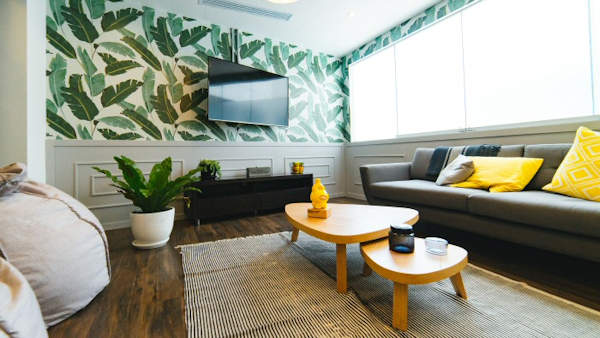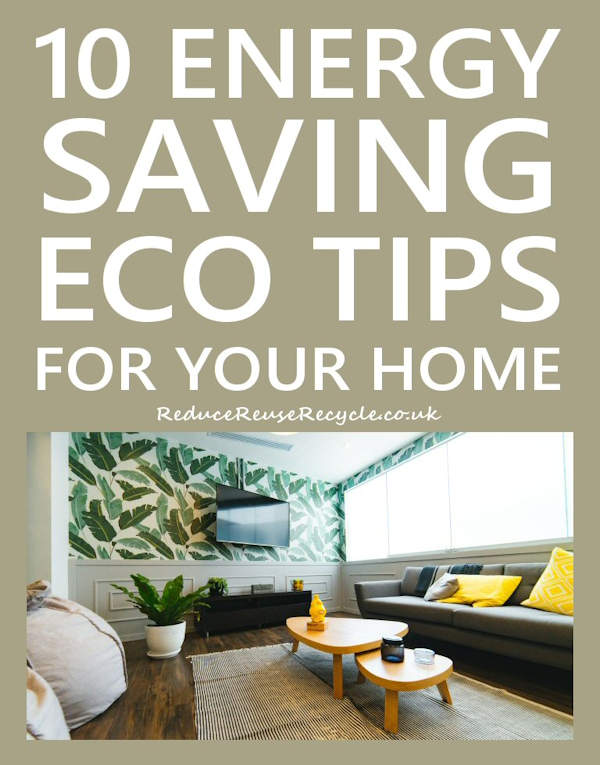10 Eco-Friendly Home Tips To Save You Money

Image Credit: Dan Gold
Recycling is only one of the ways to live a greener, more sustainable lifestyle, and it's also by no means the best one.
We are encouraged to recycle everything that we no longer need, yet there are two more important actions that we must take before we recycle anything.
The phrase Reduce, Reuse, Recycle is written in that order because the reducing the amount of resources that we use in our daily life is the first and most important step to living a sustainable lifestyle.

Here are ten ways to make your home more eco-friendly, by reducing the amount of electricity, gas and water that you use. And a bonus you will also save a lot of money too!
- Get Energy Efficient Lighting
- Insulate!
- Boil Less, Get An Eco Kettle.
- Fit Foil Behind Your Radiators.
- Switch Your Energy Tariff
- Say Bye-Bye Standby
- Waste Less Water.
- Use Your Smart Meter
- Buy Energy Efficient Appliances
- Build A Mini Power Plant

Image Credit: Alberto Sanchez
You probably have a house full of low energy halogen light bulbs - old-fashioned incandescent bulbs have been phased out over the last few years by law.
If you are still using any, when that one blows, you will have to replace it with a Compact Fluorescent Lamps (CFLs) or a Light Emitting Diode (LEDs) bulb.
Modern energy efficient light bulbs actually save much more energy that older ones, and LED bulbs are more energy efficient than CFLs, so opt for LEDs when you next need to buy a light bulb. Here is how to recycle your old light bulbs.
The last few years have given us record summer temperatures here in the UK, but it is always a good time to think about whether your house is insulated sufficiently. Not only does insulaltion keep your house warm in the winter, it will also keep it cool in the summer.
Roughly half the average house's heat is lost through the walls and the loft. If you've got cavity walls, get them insulated, and if your loft does not have the recommended thickness of insulation you should add extra to keep you cosy and help you to use less heating.
You may be entitled to help with the cost of insulation from your energy supplier under the Home Heating Cost Reduction Obligation if you are a homeowner and claiming certain benefits, or under the Carbon Emissions Reduction Obligation. To find out more visit Each Home Counts to find out the current help which is available.

Image Credit: Ethical Superstore
A recent survey revealed over a quarter of us overfill the kettle when we're boiling a cuppa. As well as wasting your time waiting for a brew, it wastes energy and CO2: the Energy Saving Trust reckons we could power the nation's street lamps if we all just boiled the right amount.
Next time you make a cuppa, take care to only put in as much water as you need to fill your teacup.
To make life even easier when you brew up, take a look at the Vektra Eco Kettle which incorporates vacuum flask technology to boil water efficiently which means that it stays hot for up to four hours so that you don’t continuously re-boil, saving money, time and energy.
It sounds a bit Blue Peter, but half the heat from most radiators goes straight out the back and, usually, gets wasted.
Fit reflective foil panels behind your radiators - it's cheap and you can pick them up at DIY stores such as B&Q or buy them online.

Image Credit: Matthew Henry
Changing your electricity supplier to a green tariff is the easiest thing you can do, and one of the most effective.
Two of the best are Ecotricity, which builds wind turbines with its customers' money, and Good Energy, which uses 100 per cent renewable energy and buys electricity from homeowners producing it at home.
You can find out which is the best tariff for your home by using the independant price comparison site Green Electricity Marketplace.
The average Brit wastes between 6 and 10 per cent of their electricity bill a year to keep gadgets unnecessarily blinking on standby.
Save yourself £38 and avoid the 'average Brit' label by turning electronics off at the wall when they're not in use - or get a gadget such as the Etekcity Wireless Remote Control Sockets.
These sockets include a remote control so that you can switch off sockets in hard to get at locations and are a really good idea for anyone with restricted mobility.

Image Credit: Matthew Bowden
In Australia, good toilet practise is to follow the mantra of 'if it's yellow, let it mellow...if it's brown, flush it down'.
While you may not want to take matters that far, we each use a staggering 150 litres of water daily in the UK, and the lavatory is one of the key water wasters.
Either get a dual-flush loo or fit an Interflush, put a Hippo water savinr in your cistern or simply stick a full plastic water bottle in your cistern so it uses less water per flush. Here is a list of all the UK water companies who offer free water saving devices to their customers.
Most people have no idea how much they're spending on electricity at home.
To get a handle on what you're spending - and what's eating the most juice - you can use a smart meter which will tell you your real-time usage in pence and pounds.
The government will offer you a free smartmeter and has a programme to have a smartmeter in every home in the UK by 2027.
Remember however, the meter itself will not save you any energy or money just by being fitted; you have to take note of how much energy you are using an make the effort to switch off those energy guzzling appliances.

Image Credit: Photo Mix
What's on in every home, 24 hours a day, 7 days a week, and 365 days a year? Yep, it's your fridge-freezer. Whenever you're replacing yours or buying other big white goods - such as washing machines and dishwashers - look out for the EU Energy Label.
It goes up to A for washing machines, but for the fridge-freezer you can now get A++, which means 'B' and 'C' aren't actually as good as they sound.
If you've already ticked off everything else on this list, it's time to create your own energy at home.
Despite our fickle weather, solar panels are surprisingly good at making electricity in this country - £7,000 worth of panels could generate half a typical UK home's annual needs - while a solar thermal installation system could provide 50 per cent of your hot water needs for much of the year.
Mini home wind turbines aren't great in cities, but they are improving all the time and could be useful if you live somewhere with wind and space.
Read More
- Things That Cannot Be Recycled
- What Is A Repair Café?
- 10 Old Fashioned Energy Saving Tips Which Will Save Money - And The Planet
What's New
- Environmental Days In January 2026
- Free Water Saving Devices For UK Residents
- STOP! Don't Put That In The Recycling!
- 21 Free Online Games About The Environment For Kids
- Best Plastic-Free Wet Wipes 2026
Most Popular in Recycling
CDs & DVDs
Videotapes & Cassettes
Duvets & Pillows
Ink Cartridges
Shredded Paper
Stamps
......Recycling A-Z